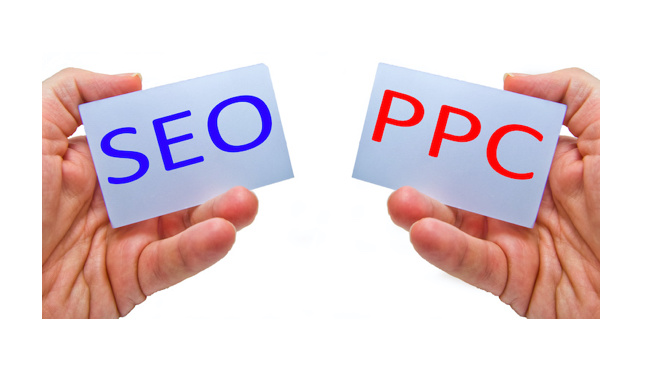Paid Ads vs. Organic Content: Buy Leads or Earn Them?
Generating new, qualified leads is crucial for sustaining and growing revenue. In the constantly changing world of digital marketing, your website...
4 min read
 Kevin Page
:
March 10, 2017
Kevin Page
:
March 10, 2017
When piecing together your digital marketing strategy, the list of tactics can be overwhelming and it may seem difficult to decide where to place your attention first. It's important to start by identifying the best ways to drive new traffic to your website — two effective approaches are paid ads (pay-per-click, PPC) and organic search results. At first glance, these tactics seem to have competing strategies. But there can be MAJOR benefits to utilizing PPC campaigns to complement your organic content strategy.
On one hand, organic results carry more authority because ranking happens through the creation of valuable content. It isn’t difficult to see that organic results are more likely to be clicked on due to the relevance of the top organic results in relationship to the search term entered. To achieve success with an organic content strategy, you must consistently offer targeted content that is tailored to the common questions, objections, motivations, and challenges of your prospects.
PPC, on the other hand, is all about immediate gratification. Campaigns allow you to choose what keywords you’d like to bid on as well as the amount you’d like to bid for each ad click. Your destination page (the site page that individuals who click the ad will be directed to) doesn’t even need to be all that relevant or valuable to the keyword term if you are willing to bid enough. Yet that short-term strategy can have consequences, because an inadvertent click on a barely relevant paid link is likely to feel like a bait and switch.
On the other hand, combining strong, relevant content with a PPC spend can give you the best of both worlds. Here are the 4 major benefits of PPC that you can use to support your long-term organic search strategy and drive better results.
Investing in PPC provides you with more opportunities to get on the first page of Google SERP (search engine results page). Did you know that, on average, the top listing in Google’s organic search results receives 33% of clicks? The first page, as a whole, garners roughly 92% of all traffic from the average search. PPC campaigns are easier to get started and can be more effective in a shorter amount of time. These campaigns allow you to have your brand’s presence on the first page for targeted keywords of your choosing while you are consistently working on boosting your organic authoritative page ranking.
Getting to the first page of the the Google is a long-term game, it takes careful planning and thoughtful content creation. Once you've identified the keywords that are part of your long-term organic strategy (the ones that have more competition and are higher to rank for), you may decide that it's worth the extra investment to create PPC campaigns around these terms.
Since these keywords are often highly competitive it can be an expensive strategy. Here are a few tips to help you keep the cost as low as possible:

While organic content strategies are best suited for long tail keyword targeting to improve rank, attract visitors, and drive conversions, PPC campaigns allow you to bid on keywords that you may never organically rank for (or at least not on the first page). Therefore, you can avoid spending all your time valiantly pushing out content with unrealistic hopes of improving the rank of a keyword with high organic competition. Instead, you can set up an ad campaign to bid a few bucks per click, get placed on the first page of Google SERP, and spend your valuable content creation time focusing on realistic and achievable long tail keywords.
You can use PPC data in your organic campaigns, and vice versa. I’d encourage you to leverage your PPC metrics to help guide you during your keyword selection process for your organic content campaigns.
Wait, there’s more! Insight from shared data extends past keywords, you can also draw takeaways from your best performing PPC ad copy to help inform your organic content strategy. It is difficult to use an organic strategy to quickly test titles, copy, and meta descriptions. PPC provides you with a platform to test a whole slew of important elements, and, when performed correctly, those insights will make your organic strategy stronger.
Metrics from both approaches can provide insights that will help inform more than just your search campaigns, but your digital marketing strategy as a whole.
PRO TIP: It's important to remember that PPC is best when not used with a "set it and forget it mentality". Make sure that you are consistently revisiting your content, checking the analytics and optimizing your ads to get the most out of your ranking organic content as well as paid placement on Google Ads.
If we remove ourselves from just thinking of search inquiries, PPC campaigns can also be setup for retargeting purposes. Retargeting is utilized to consistently keep your specific campaign (or brand as a whole) in front of individuals who’ve visited certain pages on your website. This is done through the Google Display Network (GDN). This network spans over two million websites that reach over 90% of people on the Internet. See where this might be useful?
Let’s say a prospect enters a search term and sees your organic search result near the top of the page. They click the link and end up on a blog post on your website. After consuming the blog post content, that individual elects to leave your site. Bummer, right? Not so fast. Through retargeting PPC ads, you can place your ad throughout sites within the GDN to re-engage them and hopefully encourage them to click your ad and revisit your site.
It is important to understand that there is no “one size fits all” approach to your overall marketing strategy. However, when determining which efforts you’ll be implementing to help drive traffic to your website, it may be wise to consider a combination of PPC campaigns alongside your long-term organic content strategy. This approach will help you achieve prompt visibility on search terms with high competition, smarter organic content tactics based on PPC data, and opportunities to bring non-converting web visitors back to your site to convert.

Generating new, qualified leads is crucial for sustaining and growing revenue. In the constantly changing world of digital marketing, your website...

Most marketers struggle to increase traffic to their websites, as there are a lot of ways to get from "point A to point B."

A lot has changed in the world of content marketing over the last 10 years. From the rise of social media to the prevalence of mobile phones, there...